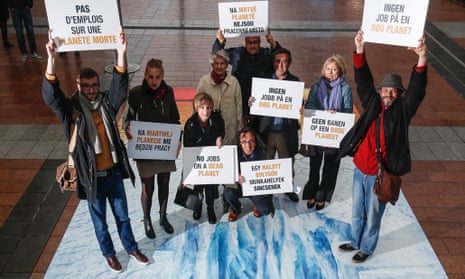Nearly a million potential jobs will be lost if EU leaders fail to agree strong climate and energy targets at a summit starting on Thursday, according to the head of Europe’s trade union movement.
Europe’s heads of state are set to sign a deal which, the Guardian understands, proposes a binding 40% greenhouse gas cut by 2030 and two goals which will not be binding on member states, one for a share of 27% of energy coming from renewable sources and another for a 27% improvement in energy efficiency.
Disagreements with eastern European states on ‘burden sharing’ to meet the targets and energy security issues in the final package are said to be narrowing.
But Bernadette Ségol, the leader of the European Trade Union Confederation which represents around 60 million workers, warned that the proposed targets were too low to reap the benefits of a new clean energy economy.
“Energy efficiency and renewable energy targets create jobs,” she told the Guardian. “The lower the target, the fewer the jobs that are created. Governments opposing ambitious and binding targets are wasting an opportunity to reduce Europe’s shameful levels of unemployment. Politicians risk throwing away up to 823,000 new jobs that could be created by more ambitious targets.”
The 823,000 jobs number is the result of ETUC analysis, which confirms an EU study into the employment effect of a 40% greenhouse gas cut, coupled with a 30% renewable energy target and strong energy efficiency goal.
Ségol called for a “just transition” to a low-carbon economy that treated workers and communities affected by energy intensive job losses fairly, while noting that climate change posed an “existential challenge to humanity.”
“There are no jobs on a dead planet,” she said.
Germany and Denmark favour most robust renewables and energy efficiency goals as do the European commission’s incoming president, Jean Claude-Juncker, as well as the outgoing climate and energy commissioners.
ETUC would prefer a more robust binding target of 40% for energy efficiency improvements, as opposed to 27% and non-binding, and a binding target to improve renewables by 30%.
But such aspirations have been opposed by the UK. With one eye on the rise of Ukip, David Cameron has let it be known that he prefers a single greenhouse gas target that would prevent Brussels from interfering with plans for the expansion of nuclear energy and shale gas.
That position received backing today from Markus Beyrer, the head of BusinessEurope, the confederation of European employers’ organisations, which includes the UK’s Confederation of British Industry (CBI).
“We think that a [single] 40% target for greenhouse gas emissions is very ambitious,” Beyrer told journalists at a press briefing in Brussels. “But the EU cannot afford to do it unilaterally. We see this as a negotiating position for the COP21 [UN climate] summit in Paris.
“We must not repeat the mistakes we made before Copenhagen [the UN climate summit in 2009] when we set a position in stone and then no-one followed us. There needs to be a review after COP21 and our position will have to be adapted to what the rest of the world does.”
Reacting to divestment threats from home insulation companies such as Knauf and Kingspan, if the EU fails to agree a high and binding energy efficiency target, Beyrer said: “We are in favour of energy efficiency and coordinate with those companies, and they are on board with our position that we have to do a lot on efficiency, but we say that a binding target is not the best way to do this as it can be a heavy cost driver.”
A spokesman for Knauf described Beyrer’s statement as “rubbish”.
Barry Lynham, Knauf Insulation’s director for strategy said: “We absolutely do not share BusinessEurope’s view on this issue. Energy efficiency is the only thing that can drive down costs and ensure significant growth in the coming years. It’s time that BusinessEurope started supporting the businesses of tomorrow and not just the ones of yesterday.”
Yesterday, several major business brands in the Prince of Wales Corporate Leaders Group – including Acciona, Coca-Cola and Philips – signed a letter to EU heads of state calling for three robust binding targets.
The fossil fuel company Shell, which signed the letter, now has a more ambitious climate position on paper than a clutch of EU states, including the UK.






Comments (…)
Sign in or create your Guardian account to join the discussion